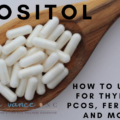If you have hypothyroid (underfunctioning thyroid gland), high stress, insomnia, or immune challenges, read on. Ashwagandha may offer you incredible benefits.
Ashwagandha, also known as Indian ginseng, is a nightshade plant used in Ayurvedic medicine. It’s an adaptogenic herb, meaning it helps your body adjust to stress and maintain homeostasis. Adaptogens regulate hormone levels like a thermostat: If, for example, stress hormone levels are too high or low, adaptogens will aid in normalizing and bringing them to more ideal levels. In Ayurvedic healing, the herb is known for its potential to impart the vigor and strength of a stallion.
I love adaptogens and use and recommend them often for stress, insomnia, and endocrine balance. Aside from ashwagandha, I frequently recommend rhodiola, ginseng, holy basil (AKA tulsi), and schizandra. You can read my post all about adaptogens here. Side note: you can find these herbs altogether in this adaptogenic herbal formula that’s great for stress and sleep.
Let’s take a look at ashwagandha’s benefits and how to use this wonderful herb.
Ashwagandha Benefits
Ashwagandha is a tonic herb that supports a depleted system and tonifies the nervous system. I often recommend it for people dealing with intense or ongoing stress: think divorce, a move, stressful job situation, a death. I think it can be very useful for insomnia, especially as it relates to stress and anxiety. Please see the dosing section below, as you may need some tweaking to get it right (that has been the case for me personally).
Ashwagandha’s benefits include the following:
- Immune support and balance: smaller trials indicate that ashwagandha may increase white blood cell counts and support immune health. (source) Use caution, however, as it may overstimulate the immune system in certain individuals, especially those with autoimmune conditions. (source)
- Hypothyroid: could offer pretty significant benefits to boost and regulate low levels of thyroid hormone, but more research is needed. An 8-week study in 50 people with hypothyroidism found that taking 600 mg of ashwagandha root extract daily led to significant improvements in thyroid levels, especially T3 (the active form of thyroid hormone). (source) I use ashwagandha for hypothyroidism myself and have recommended it to my clients.
- Anxiety: research does show good results for anxiety with the typical 600mg dose. This may be because ashwagandha lowers cortisol in those with elevated levels. Cortisol is one of your main stress hormones that, when elevated, exacerbates or causes anxiety. (source)
- Stress and adrenal insufficiency: helpful in regulating cortisol to reduce stress and strengthen adrenals.
- Infertility: boosts testosterone and sperm count in men, and improves sexual function and raises low testosterone in women. (source)
- Sexual dysfunction: used to treat sexual issues and erectile dysfunction in men and has been advocated to ameliorate diminished sexual desire in women and in all forms of sexual dysfunction, particularly where a depleted nervous system is playing a role. (source)
- Boosts general vitality and stamina: may support muscle mass and boost endurance. (source)
- Sleep: many studies show ashwagandha supports a natural sleep cycle and improves quality of sleep, probably because it regulates the nervous system and stress hormone levels.
- Decreases inflammation, protects against oxidative damage due to its antioxidant properties.
- Cancer: I’ve come across many studies showing that ashwagandha might be able to stop cell growth in certain cancers. (source) Also combats neutropenia, low white blood cell counts that occur as a side effect of chemo.
Ashwagandha may also support blood sugar, reduce pain, improve depression, and protect the brain against Alzheimer’s.
Ashwagandha Dosing & How to Use
Plants are powerful medicine and should be used with caution and after researching if you’re a good candidate (or via the advice of a professional). Not all adaptogens work for everyone, and you may need to tinker with the dosage. Also keep in mind that more is not always better! Less probably isn’t going to do the trick, and more may actually cause more stress on your system, so you need to find that Goldilocks dose. In the case of ashwagandha, use caution if you have a nightshade sensitivity.
The basic dose I see for most applications is 300mg twice daily (600mg total daily). (source) Try this for anxiety, stress, hypothyroid, and insomnia. If you don’t notice any benefits after 2-4 weeks, increase the dose by 300mg. Most studies I’ve seen use between 600mg-1400mg, so I don’t recommend exceeding that for most cases. Always start with a lower dose and work up until you feel benefits, then don’t exceed that dosage.
Fore fertility and sexual dysfunction, I’ve seen higher doses than 600mg recommended. For improvement in testosterone levels and sex drive try 1,000-1,400mg doses.
I tried a basic 600mg dose on myself to support hypothyroid a few months back and didn’t see any benefit (not even on blood work). I’m trying it again to address stress, trouble sleeping associated with stress, and hypothyroid support. This time I’m taking 1,000mg and do feel a more noticeable benefit in stress reduction and overall vitality.
Most often the root and berries are used for ashwagandha supplements. I use and recommend this blend which contains a blend of three unique and well-researched forms of ashwagandha extracts. Each cap is 600mg, so you can take 1-2 capsules. You can also make a tea using the powdered root.
You can take the herb anytime in divided doses (meaning twice daily). For anxiety I recommend using it in the morning and afternoon. For insomnia and other issues, try taking it in the afternoon and evening. It’s safe to use long term, but I recommend taking a break with adaptogenic herbs after 6 months because they lose effectiveness.
No toxicity has been noted with ashwagandha, but higher doses may cause gastrointestinal issues. (source)
Side Effects
Although ashwagandha is well-tolerated and generally considered to safe, possible side effects include upset stomach, vomiting, diarrhea, and indigestion. I also wouldn’t recommend taking this herb if you have hyperthyroidism, as it may be too stimulating. Be aware that ashwagandha may lower blood pressure, so if you are on BP meds or have low BP, use caution.
I do not recommend ashwagandha for autoimmune disease, hyperthyroid, pregnancy, or breast feeding.
Have you tried ashwagandha? What have you noticed?
Pin it!

Mary Vance is a Certified Nutrition Consultant and author specializing in digestive health. She combines a science-based approach with natural therapies to rebalance the body. In addition to her 1:1 coaching, she offers courses to help you heal your gut and improve your health. Mary lives in San Francisco and Lake Tahoe in Northern California. Read more about her coaching practice here and her background here.








